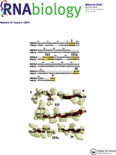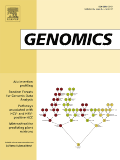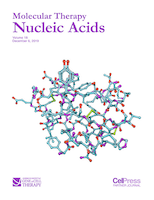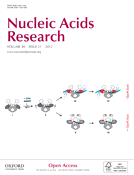
RNA Biology
metrics 2024
Illuminating the Role of RNA in Life's Processes
Introduction
RNA Biology is a premier journal published by Taylor & Francis Inc, focusing on the intricate and evolving field of RNA research. With an ISSN of 1547-6286 and E-ISSN of 1555-8584, this journal has established itself as an essential resource for professionals, researchers, and students engaged in both molecular and cell biology. Recognized in the 2023 quartile rankings, RNA Biology holds a distinguished Q1 category in Molecular Biology and a Q2 category in Cell Biology, indicative of its significant impact and reputation within the scientific community. The journal emphasizes the importance of RNA in various biological processes, highlighting both fundamental and applied aspects, which is crucial for advancing our understanding of gene expression and regulation. With a strong Scopus ranking, including Rank #105/410 in Molecular Biology and Rank #83/285 in Cell Biology, RNA Biology is not just a publication but a vital platform for sharing groundbreaking findings and insights into RNA research. With a convergence that spans from 2004 to 2024, the journal promises to continue its legacy of excellence in disseminating important discoveries in RNA science, contributing richly to ongoing scientific dialogue and innovation.
Metrics 2024
 1.51
1.51 3.60
3.60 4.50
4.50 110
110Metrics History
Rank 2024
Scopus
IF (Web Of Science)
JCI (Web Of Science)
Quartile History
Similar Journals

GENOMICS
Navigating the Landscape of Molecular BreakthroughsGENOMICS is a prestigious journal published by Academic Press Inc Elsevier Science, dedicated to advancing the field of genetic research and molecular biology. With an impressive impact factor, this journal is recognized for its rigorous peer-review process and high-quality publications that cover a wide range of topics within the genomics discipline. Operating from the United States, GENOMICS has established itself as a vital resource for researchers, professionals, and students alike, standing at Q2 in the Genetics category according to the latest rankings. With a rich history dating back to 1987 and convergence extending to 2024, the journal highlights cutting-edge discoveries and methodologies, ensuring that its readership remains at the forefront of genetic advancements. Although currently not an open-access journal, articles published within its pages are often accessible through various academic platforms, enhancing worldwide reach and dissemination. For those engaged in the fields of biochemistry, genetics, and molecular biology, GENOMICS serves as an indispensable platform for impactful research and collaborative initiatives.

BIOCHEMICAL GENETICS
Unraveling the Complexities of Life at the Molecular LevelBIOCHEMICAL GENETICS, published by Springer/Plenum Publishers, is a prominent journal in the fields of biochemistry, genetics, and molecular biology, with a substantial impact on the scientific community since its inception in 1967. The journal holds a significant position within various academic quartiles, ranking Q2 in Ecology, Evolution, Behavior and Systematics, and Q3 in Biochemistry, Genetics, and Medicine (miscellaneous), among others, demonstrating its diverse and interdisciplinary reach. With an ISSN of 0006-2928 and an E-ISSN of 1573-4927, it is recognized for contributing critical research insights and methodologies that drive the fields of biochemical genetics forward. Although it is not an Open Access journal, it provides vital access options and resources for researchers globally, facilitating the dissemination of knowledge across institutions. Positioned within the competitive landscape of Scopus rankings, it maintains respectable standings across its focused areas, making it an invaluable resource for researchers, professionals, and students seeking to deepen their understanding of genetic mechanisms and biochemical processes.

NUCLEOSIDES NUCLEOTIDES & NUCLEIC ACIDS
Catalyzing Advances in Nucleic Acid ScienceNUCLEOSIDES NUCLEOTIDES & NUCLEIC ACIDS is a vital academic journal published by Taylor & Francis Inc, dedicated to the intricate and evolving domains of biochemistry, genetics, and molecular medicine. With an ISSN of 1525-7770 and E-ISSN of 1532-2335, this journal aims to provide a comprehensive platform for the dissemination of research findings, reviews, and methodologies related to nucleosides, nucleotides, and nucleic acids. As a research journal thriving since its inception in 2000, it reflects a diverse spectrum of studies crucial for advancing knowledge in biochemistry (ranked Q4) and genetics (Q4), while also achieving Q3 status in medicine (miscellaneous). Despite its current standing in the quartiles and Scopus rankings indicative of an emergent trajectory, the journal retains significant relevance for those delving into interdisciplinary research that intersects these fields. Researchers, professionals, and students alike can explore a plethora of original research articles, thought-provoking reviews, and updates on pioneering advances that shape our understanding of molecular biology. With its unwavering commitment to scholarly excellence, NUCLEOSIDES NUCLEOTIDES & NUCLEIC ACIDS continues to be an essential resource for those aiming to contribute to and stay informed about this pivotal area of scientific inquiry.

Non-Coding RNA
Leading the Charge in Non-Coding RNA InsightsNon-Coding RNA is a prestigious open-access journal published by MDPI, based in Switzerland, dedicated to the significant and rapidly evolving field of non-coding RNA research. Established in 2015, this journal has quickly become an essential resource for researchers and professionals, showcasing innovative studies and breakthroughs related to the functions and mechanisms of non-coding RNAs in various biological processes. With an impressive Q1 ranking in Biochemistry and strong rankings in Genetics and Molecular Biology, Non-Coding RNA consistently reflects the highest standards of academic publishing. The journal provides comprehensive access options, granting researchers worldwide the ability to disseminate and access high-quality research without subscription barriers. As the landscape of genomics and molecular discoveries continues to expand, the journal aims to foster interdisciplinary exchanges and collaborations, making it a vital platform for advancing knowledge and innovation in this critical area of biological science.

MOLECULAR BIOLOGY
Connecting Researchers to the Heart of Molecular BiologyMOLECULAR BIOLOGY, published by PLEIADES PUBLISHING INC, serves as a vital repository for the dissemination of innovative research within the fields of biochemistry, genetics, and molecular biology. With an ISSN of 0026-8933 and an E-ISSN of 1608-3245, this journal has been a mainstay in the scientific community since its inception, embracing its deep historical roots from 1971 to the present. Recognized for its qualitative contributions, MOLECULAR BIOLOGY is ranked in the Q3 quartile for Biophysics and Q4 for Structural Biology, placing it among select journals in its domain. Researchers and students alike benefit from its rigorous peer-reviewed articles, which focus on all aspects of molecular mechanisms and interactions. The journal's inclusion in prestigious databases underlines its commitment to academic excellence. The editorial board is dedicated to fostering the sharing of influential findings, making it an essential resource for advancing knowledge and innovation in molecular biology.

Frontiers in Cell and Developmental Biology
Fostering collaboration for groundbreaking biological discoveries.Frontiers in Cell and Developmental Biology is a leading open-access journal published by FRONTIERS MEDIA SA, dedicated to advancing the understanding of fundamental biological processes at the cellular and developmental levels. Since its inception in 2013, the journal has positioned itself as a cornerstone of research in its field, achieving esteemed Q1 quartile rankings in both Cell Biology and Developmental Biology for 2023. With a robust Scopus ranking of #13 out of 82 in Developmental Biology and #67 out of 285 in Cell Biology, it represents a vital platform for innovative research and scholarly discourse. The journal provides a comprehensive and accessible avenue for researchers, professionals, and students alike to share high-quality findings and insights into cellular mechanisms and developmental processes, fostering collaboration and knowledge exchange in the global scientific community. Based in Lausanne, Switzerland, Frontiers in Cell and Developmental Biology is committed to open science, ensuring that all articles are freely accessible to the public, thereby broadening the impact of research in the biological sciences.

CRITICAL REVIEWS IN EUKARYOTIC GENE EXPRESSION
Exploring the Depths of Eukaryotic Gene RegulationCRITICAL REVIEWS IN EUKARYOTIC GENE EXPRESSION, published by BEGELL HOUSE INC, serves as a vital resource within the fields of Genetics and Molecular Biology. With the ISSN 1045-4403 and E-ISSN 2162-6502, this journal has been contributing to scientific discourse since 1990 and is projected to continue its publication until 2024. Despite its classification in the Q3 quartile for both Genetics and Molecular Biology, its impact on the research community is significant, as evidenced by its diverse range of critical reviews that synthesize and analyze emerging trends and foundational studies in gene expression. The journal, located in the United States at 50 North St, Danbury, CT 06810, offers a platform for researchers, professionals, and students to engage with innovative ideas and methodologies that drive forward the understanding of gene regulatory mechanisms in eukaryotes. Although it currently does not offer open access, the journal's content remains crucial for those dedicated to advancing knowledge in the intricacies of genetic expression.

Molecular Therapy Nucleic Acids
Advancing nucleic acid innovations for a healthier tomorrow.Molecular Therapy Nucleic Acids is a premier open-access journal published by CELL PRESS, dedicated to advancing the field of molecular medicine through the innovative application of nucleic acid-based therapies. Since its inception in 2012, this journal has become an essential resource for researchers and professionals in drug discovery and molecular medicine, reflected in its status as a Q1 journal in both categories for 2023. With a notable impact factor and high rankings in Scopus, including #8 out of 157 in Drug Discovery and #16 out of 178 in Molecular Medicine, it serves to disseminate groundbreaking research and foster collaborations among scientists worldwide. The journal's comprehensive scope encompasses a wide variety of topics, including gene therapy, RNA interference, and CRISPR technology, ensuring that it remains at the forefront of scientific excellence. With open access availability, Molecular Therapy Nucleic Acids actively promotes the widespread dissemination of knowledge, making its crucial insights accessible to students, researchers, and industry professionals alike.

Non-coding RNA Research
Bridging Science and Therapeutics through Non-Coding RNANon-coding RNA Research, published by KEAI PUBLISHING LTD, is a leading open-access journal dedicated to advancing the field of non-coding RNA, a critical component in the landscape of molecular biology and genetics. Established in 2016, this journal aims to provide a platform for the dissemination of high-quality research focusing on the roles, mechanisms, and therapeutic potentials of non-coding RNAs in various biological processes and diseases. With impressive Scopus rankings placing it in the top quartile for both Biochemistry and Medical Biochemistry, as well as notable standings in Genetics and Molecular Biology, Non-coding RNA Research continues to attract contributions from globally recognized experts. The journal's commitment to open access ensures broad visibility and engagement with cutting-edge discoveries, thereby fostering an inclusive scientific dialogue that enhances understanding and innovation in this rapidly evolving field. For researchers and scholars, the opportunity to publish in a Q1 ranked journal not only validates their work but also enhances its impact, making Non-coding RNA Research an indispensable resource for anyone interested in the intricate workings of non-coding RNA.

NUCLEIC ACIDS RESEARCH
Pioneering Research in Molecular BiologyNUCLEIC ACIDS RESEARCH, published by Oxford University Press, is a premier peer-reviewed journal in the field of genetics, holding a prestigious Q1 ranking in this domain as of 2023. Since its inception in 1974 and with a converged publication horizon extending to 2024, this journal has established itself as a vital resource for researchers and professionals interested in the molecular aspects of nucleic acids, encompassing DNA and RNA studies as well as their implications in biochemistry and molecular biology. With an impressive Scopus rank of #6 out of 347 in Genetics, this journal is positioned in the 98th percentile among its peers, highlighting its significant impact and relevance in the scientific community. As an open access journal since 2005, NUCLEIC ACIDS RESEARCH ensures wide dissemination of knowledge, promoting collaborative advancements in genetic research. For those looking to stay at the forefront of nucleic acid research, this journal remains an essential publication for accessing cutting-edge findings and innovative methodologies in the field.